

FREE Rhyming Dictionary: Find Rhyming Words in Seconds. Five Best Mind Mapping Tools. How I Went From Writing 2,000 Words a Day to 10,000 Words a Day. Flash drafting our way to a “best first draft”. 60 Awesome Search Engines for Serious Writers. June 20th, 2010 Finding the information you need as a writer shouldn’t be a chore.
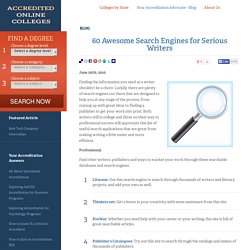
Luckily, there are plenty of search engines out there that are designed to help you at any stage of the process, from coming up with great ideas to finding a publisher to get your work into print. Both writers still in college and those on their way to professional success will appreciate this list of useful search applications that are great from making writing a little easier and more efficient. Professional Find other writers, publishers and ways to market your work through these searchable databases and search engines. Writing These helpful tools will help you along in the writing process.
Research. Bullet Journal: An analog note-taking system for the digital age. How Does Writing Affect Your Brain? Most of us write a little something everyday.
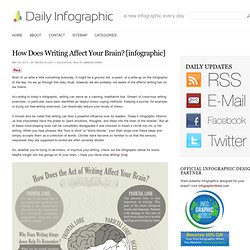
It might be a grocery list, a poem, or a write-up on the infographic of the day. As we go through this daily ritual, however, we are probably not aware of the effects writing has on our brains. According to today’s infographic, writing can serve as a calming, meditative tool. Stream of conscious writing exercises, in particular, have been identified as helpful stress coping methods. Keeping a journal, for example, or trying out free-writing exercises, can drastically reduce your levels of stress. It should also be noted that writing can hold a powerful influence over its readers. So, whether you’re trying to de-stress, or improve your writing, check out the infographic below for some helpful insight into the goings-on of your brain. Share This Infographic.
Effective communicators. Plain Language - Clear Communication: An NIH Health Literacy Initiative. Introduction to Plain Language at NIH Plain language is grammatically correct language that includes complete sentence structure and accurate word usage. Plain language is not unprofessional writing or a method of "dumbing down" or "talking down" to the reader. Writing that is clear and to the point helps improve communication and takes less time to read and understand. Clear writing tells the reader exactly what the reader needs to know without using unnecessary words or expressions. Communicating clearly is its own reward and saves time and money. Plain Language Act President Barack Obama signed the Plain Writing Act of 2010 (H.R. 946/Public Law 111-274) on October 13, 2010. Part of the NIH mission is to reach all Americans with health information they can use and to communicate in a way that helps people to easily understand research results. Celebrating Plain Language at NIH Plain Language/Clear Communications Awards Program Tips for Using Plain Language:
The Ultimate Guide to Writing Better Than You Normally Do. Writing is a muscle.
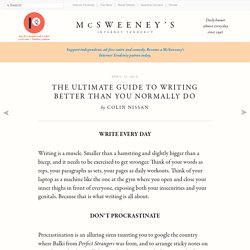
Smaller than a hamstring and slightly bigger than a bicep, and it needs to be exercised to get stronger. Think of your words as reps, your paragraphs as sets, your pages as daily workouts. Think of your laptop as a machine like the one at the gym where you open and close your inner thighs in front of everyone, exposing both your insecurities and your genitals. Because that is what writing is all about. Procrastination is an alluring siren taunting you to google the country where Balki from Perfect Strangers was from, and to arrange sticky notes on your dog in the shape of hilarious dog shorts. The blank white page. Mark Twain once said, “Show, don’t tell.” Perfection kills progress. Explaining vs. Storytelling for Startups. Seattle investor and “startup guy” Chris Devore recently wrote about four categories of effort that will help founders show that their startup is growing and healthy.
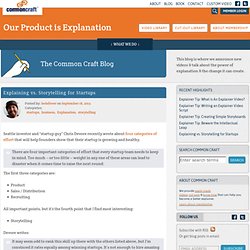
There are four important categories of effort that every startup team needs to keep in mind. Too much -- or too little -- weight in any one of these areas can lead to disaster when it comes time to raise the next round: The first three categories are: ProductSales / Distribution Recruiting All important points, but it’s the fourth point that I find most interesting: Storytelling Devore writes: It may seem odd to rank this skill up there with the others listed above, but I'm convinced it rates equally among winning startups.
Plain language. Call yourself an asshole - Straight shooter. David Paul Morris/Getty Images Everyone "knows" Steve Jobs, or thinks they do, in the sense that we saw him do those legendary on-stage product launches of the iPhone and the iPad.

But what was Jobs like when he was off stage, when he wasn't changing history with Steve Wozniak, Bill Gates, Jony Ive and Tim Cook? There's an amazing thread on Quora, the question-and-answer site, for people to tell stories of the times they "randomly" met Steve Jobs. We've edited a few — there are many more on the thread, go look! — and excerpted them here. This person told Jobs he would "ruin" Apple. Writing a Research Proposal. Paul T.
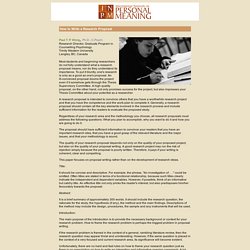
P. Wong, Ph.D., C.Psych. Research Director, Graduate Program in Counselling Psychology Trinity Western University Langley, BC, Canada Most students and beginning researchers do not fully understand what a research proposal means, nor do they understand its importance.